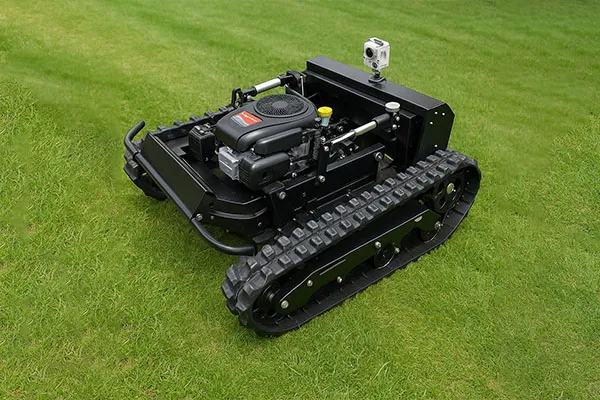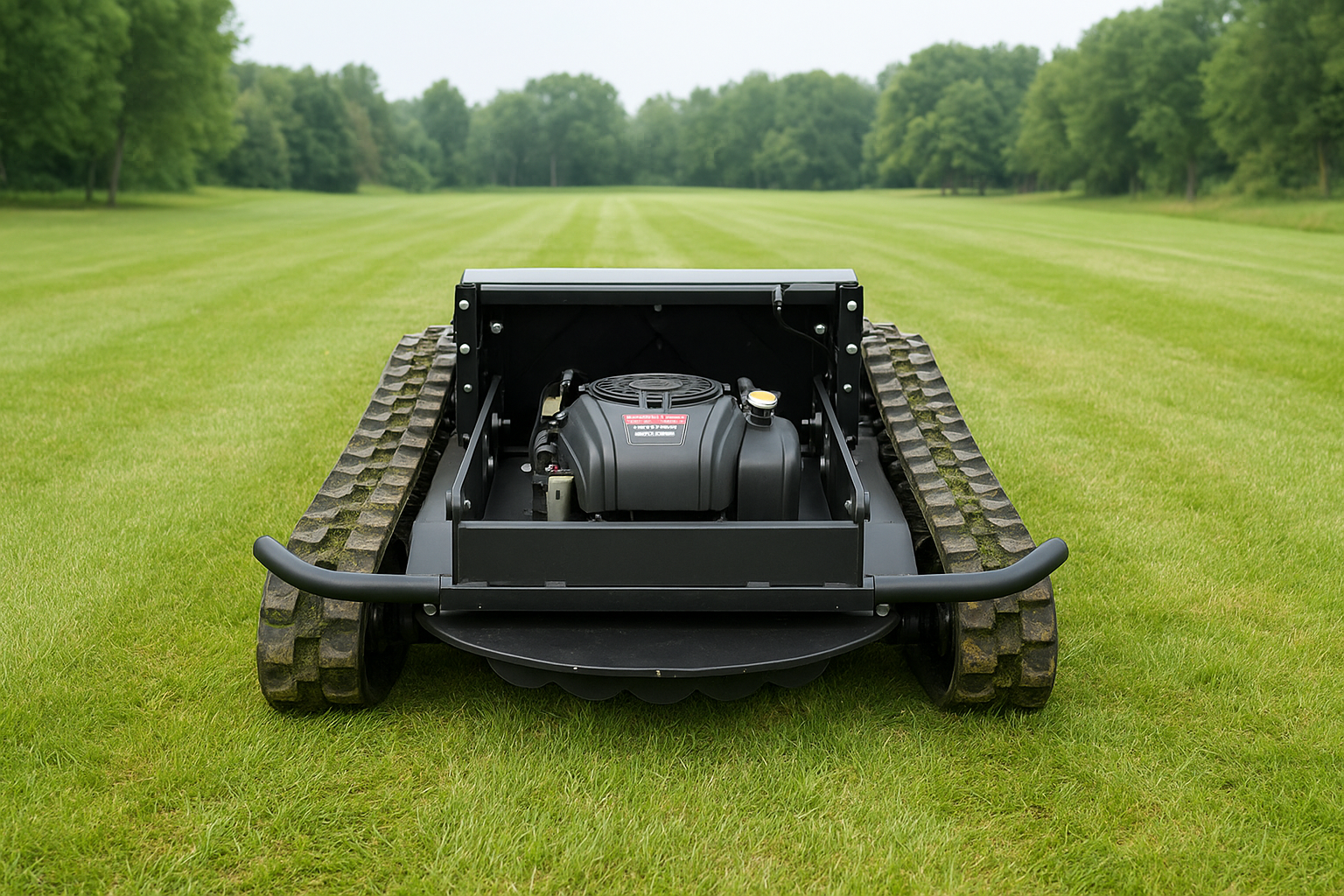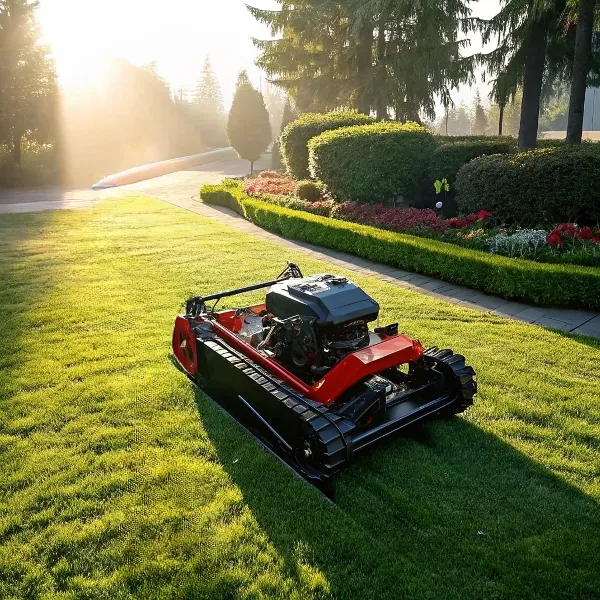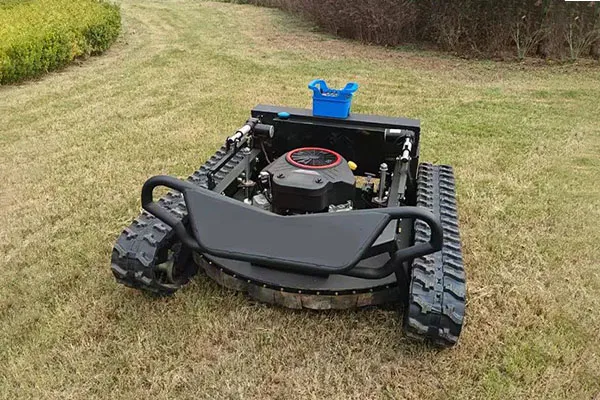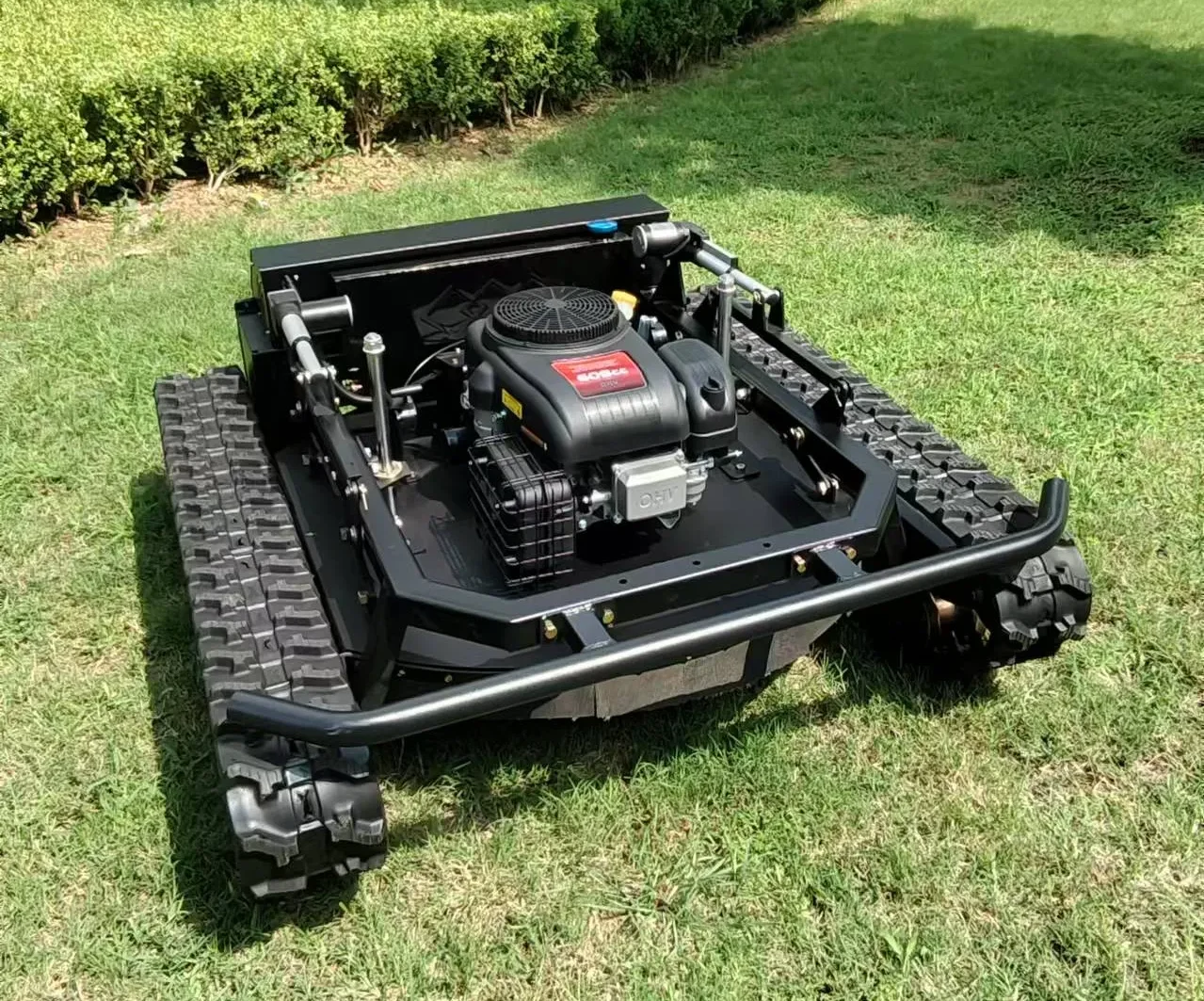Struggling with the high fuel costs, constant maintenance, noise, and emissions of traditional gas mowers? These issues eat into your profits, disrupt operations, and complicate compliance. As manufacturers focused on operational efficiency, we introduce a smarter solution: high-quality commercial electric lawn mowers.
Commercial electric lawn mowers are battery-powered machines designed for the demanding needs of professional lawn care, landscaping, and grounds maintenance businesses. They leverage advanced battery technology (like 40V or 60V systems) to deliver robust cutting power and runtime comparable to some gas models, but with significant benefits like zero emissions, quieter operation, reduced maintenance costs, and improved operator comfort, making them a viable and often superior choice for commercial fleets.

Greetings from our team, specialists in manufacturing high-quality, durable equipment designed for demanding commercial environments. While you might know us best as a Danish Trolley Manufacturing plant focused on optimizing logistics and material handling for Greenhouse Growers, Nursery Operators, Garden Centers, and similar businesses, we understand that efficiency extends to every tool you use. Just as our trolleys provide reliable service life and help control costs in your core operations, the equipment you use for grounds maintenance – like your lawn mower fleet – plays a vital role in your overall productivity and budget.
The landscaping and grounds maintenance industry is undergoing a significant shift towards electrification. Commercial electric lawn mowers are no longer just a niche option; they represent a powerful, efficient, and increasingly cost-effective alternative to traditional gas-powered equipment. For businesses like yours that prioritize reliability, durability, integrated cost control, and increasingly, regulatory compliance regarding noise and emissions, understanding the capabilities of modern electric mowers is crucial. Let’s explore how this cutting-edge technology can benefit your operations.
Why Consider Commercial Electric Lawn Mowers for Your Operation?
The decision to transition from traditional gas-powered mowers to commercial electric models is driven by a confluence of factors directly impacting your bottom line and operational efficiency. For businesses managing greenhouses, nurseries, garden center displays, municipal green spaces, or large farm landscapes, the drawbacks of gasoline engines are becoming increasingly apparent.
Consider the daily realities of using gas mowers:
- Fuel Costs: Volatile gas prices directly impact operational budgets. Refueling takes time and logistics.
- Maintenance: Gas engines require regular oil changes, spark plug replacements, air filter cleaning/replacement, fuel stabilization, and carburetor adjustments. This means downtime, labor costs, and parts expenses (maintenance costs).
- Noise Levels: Loud gas engines can violate noise ordinances, limit operating hours in residential or commercial areas, and contribute to operator fatigue.
- Emissions: Exhaust fumes contain pollutants harmful to the environment and operator health. Increasingly stringent regulations target these emissions.
- Vibration: High vibration levels from gas engines can lead to operator discomfort and long-term health concerns (Hand-Arm Vibration Syndrome).
Commercial electric lawn mowers directly address these pain points, offering a compelling alternative focused on efficiency, reduced operating costs, and improved working conditions – principles we value deeply in our own manufacturing processes for reliable equipment like Danish Trolleys.
How Does Battery Technology Power Modern Electric Mowers?
The heart of any modern commercial electric mower is its battery system. Gone are the days of underpowered lead-acid batteries. Today’s professional electric equipment relies on advanced Lithium-ion battery technology, delivering high power density, longer runtime, and faster charging capabilities. Understanding the basics helps appreciate their performance.
- Lithium-Ion Batteries: These are the standard, offering the best balance of energy storage, weight, and lifespan. They don’t suffer from the “memory effect” seen in older battery types.
- Voltage (V): Represents the electrical potential or “pressure.” Higher voltage generally allows for more power delivery to the motor and cutting blade. Common platforms for commercial use include 40V, 60V (like Toro’s 60V Max system), and even higher voltage systems (e.g., 82V). A higher volt rating often indicates greater power potential.
- Amp-hours (Ah): Measures the battery’s capacity or how much energy it can store, directly influencing run time. A higher Ah rating means the mower can operate longer on a single charge.
- Interchangeable Batteries: Many manufacturers offer a battery system where the same battery pack can power multiple pieces of outdoor power equipment (e.g., trimmers, blowers, chainsaws). This enhances flexibility and return on investment as you only need a few batteries and chargers for a whole fleet of tools. Our focus on systems thinking, seen in versatile products like flower carts, resonates with this efficient approach.

The engineering behind these battery systems ensures they can deliver sustained power to handle tough grass conditions often encountered in commercial settings. Reliable charging infrastructure is key – ensuring batteries can recharge quickly (sometimes in under 3 hours) is crucial for maintaining workflow.
Are Battery-Powered Mowers Powerful Enough for Commercial Lawn Care?
This is a common question, especially for those accustomed to the raw power of high-horsepower gas engines. The answer is increasingly yes. Modern commercial electric mowers are engineered to deliver performance that meets, and sometimes exceeds, the needs of professional lawn care.
Performance isn’t just about voltage; it’s about how that power is translated into cutting action. Key factors include:
- Brushless Motors: These advanced electric motors are more efficient, generate more torque (twisting force), run cooler, and have a longer lifespan than older brushed motors. They adapt power output based on cutting conditions, providing extra power when needed for thick grass.
- Torque: While horsepower figures might seem lower than gas models, electric motors deliver instant torque, meaning the blade gets up to speed immediately and maintains cutting power more effectively in dense patches without bogging down as easily.
- Cut Quality: Manufacturers focus heavily on deck design and blade speed optimization to ensure a clean, professional cut quality, comparable to high-end gas-powered counterparts. Features like mulching capabilities (mulch, bag, or side discharge) are standard.
While an entry-level homeowner electric mower might struggle with demanding commercial work, dedicated commercial electric models, including self-propelled lawn mower options, are specifically designed with the power and durability needed to mow large areas and challenging terrain efficiently throughout the workday. They offer a viable, powerful alternative for professional landscape maintenance.
Push Mower vs. Self-Propelled Electric Mowers: Which is Better for Efficiency?
For commercial applications covering significant ground, the choice between a basic push mower and a self-propelled electric mower heavily favors the latter in terms of operator efficiency and reduced fatigue.
- Push Mower: Requires the operator to provide all the force needed to move the mower forward. While lighter and simpler, this becomes physically demanding when mowing large areas, slopes, or thick grass for extended periods. This can slow down work and increase operator fatigue, potentially impacting overall productivity.
- Self-Propelled Mower: Features a drive system (usually variable speed) that propels the mower forward, requiring the operator primarily to guide it. This significantly reduces physical effort, especially on hills or uneven terrain.
- Benefits: Faster mowing speeds are possible, operator fatigue is reduced (leading to more consistent work quality throughout the day), and navigating challenging terrain becomes easier.
- Consideration: Self-propelled systems draw some power from the battery, slightly reducing overall runtime compared to an identical push model, but the gains in productivity usually outweigh this minor difference in commercial settings.
For most commercial lawn care scenarios involving walk-behind mowers, a self-propelled electric lawn mower is the more efficient and ergonomic choice, contributing to faster job completion and better operator well-being – critical factors for businesses focused on cost control and reliable service delivery.
What About Runtime and Charging for Commercial Electric Equipment?
Runtime – how long a mower can operate on a single battery charge – is a critical factor for commercial users who need equipment to last through demanding workdays. Manufacturers of commercial electric equipment understand this and design their systems accordingly.
- Battery Capacity (Ah): As mentioned, higher Ah ratings translate to longer runtime. Commercial batteries often range from 5.0Ah to 10.0Ah or even higher.
- Multiple Batteries: Professional crews typically operate with multiple battery packs per mower. While one battery is in use, others are on the charger, allowing for near-continuous operation by swapping batteries as needed.
- Smart Technology: Many systems incorporate technology that optimizes power draw based on conditions, extending runtime. For instance, the mower might reduce blade speed slightly in light grass to conserve energy.
- Charging Solutions: Rapid chargers are essential. Look for chargers that can fully recharge a high-capacity commercial battery in a reasonable timeframe (e.g., 60-90 minutes, though some may take up to 3 hours depending on capacity and charger type). Multi-port chargers allow crews to recharge several batteries simultaneously overnight or during breaks.

Crawler Robot Lawn Mower
While a single battery might provide 45-90 minutes of runtime depending on the mower, battery size, and cutting conditions, a strategy involving multiple batteries and efficient charging ensures that commercial electric mowers can meet the demands of a full workday. The battery life (total number of charge cycles before capacity degrades) is also improving, ensuring long-term value.
Can Electric Riding Mowers Compete with Gas-Powered Counterparts?
The market for commercial electric riding mowers is rapidly expanding and becoming increasingly competitive with traditional gas-powered options. While gas still dominates the very high end (e.g., large zero-turns for massive properties), electric riders offer compelling advantages for many commercial applications.
- Performance: Modern electric riding mowers offer substantial cutting power, often utilizing multiple high-voltage batteries (60V or higher) and powerful brushless motors for both the drive wheels and the cutting deck blades. Their cut quality and ability to handle slopes and varying grass conditions are comparable to many commercial gas riders. Companies like Toro are actively developing and marketing commercial-grade electric riders.
- Benefits: They bring the same advantages as electric walk-behinds: zero emissions, significantly quieter operation (huge benefit for working near clients, hospitals, schools, or residential areas), dramatically less maintenance (no engine oil, belts, filters), and lower running costs (electricity vs. gas).
- Runtime: This remains a key consideration. Commercial electric riders use large battery packs designed for extended runtime, often sufficient for several hours of continuous mowing. Strategies involve midday charging or swappable battery packs on some models.
- Cost: Initial purchase price is often higher than comparable gas models, but the Total Cost of Ownership (TCO) can be significantly lower when factoring in fuel and maintenance savings over the machine’s lifespan. The return on investment calculation becomes very attractive.
For landscape contractors, municipalities, and large property managers looking to reduce their environmental impact, lower operating costs, and comply with noise regulations, commercial electric riding mowers represent a viable and increasingly powerful option.

Crawler Robot Lawn Mower
If the electric mower costs $1500 more upfront than the gas mower, the $950 annual operating savings could lead to payback in under two years, with continued savings thereafter. Businesses should perform their own detailed calculations based on usage patterns and local costs.
Durability and Service Life: Are Electric Lawn Mowers Built for Commercial Use?
A legitimate concern for businesses transitioning to electric is whether these mowers possess the durability and strength and durability required for rigorous daily commercial use. Manufacturers of commercial electric lawn mowers understand this and construct their machines accordingly.
Key aspects contributing to commercial-grade durability:
- Heavy-Duty Construction: Commercial models typically feature robust steel cutting decks (not plastic like some homeowner models), reinforced handles, durable wheels, and protective bumpers. The overall build quality is designed to withstand the knocks and stresses of professional use.
- Brushless Motors: As mentioned, these motors are inherently more durable and have a longer lifespan than brushed motors or many small gas engines due to fewer wear components.
- Weather Resistance: Components are often sealed or protected against dust and moisture encountered during normal operation (though pressure washing electronics is generally not advised).
- Component Quality: Higher quality bearings, switches, and wiring are used compared to residential-grade electric mowers.
- Warranty: Reputable manufacturers back their commercial electric lawn mowers with substantial warranties (e.g., 3-year limited warranties on the tool and sometimes the battery), reflecting confidence in their durability. Toro’s commercial warranties are often highlighted.
While any machine requires proper care, high-quality commercial electric mowers are specifically engineered for the demanding service life expected by professional lawn care operators. Their design often incorporates principles of robustness similar to what we prioritize in our heavy-duty material handling equipment like roll containers.
Environmental Benefits and Regulatory Compliance: Why Go Electric?
Beyond the operational cost savings, switching to commercial electric lawn mowers offers significant environmental advantages and helps businesses stay ahead of increasingly strict regulations.

lawn mower
- Zero Emissions: Battery-powered mowers produce zero point-of-use emissions. This eliminates harmful pollutants like carbon monoxide, nitrogen oxides, and particulate matter associated with gas-powered engines. This is crucial for operator health, client well-being (especially around hospitals, schools, homes), and overall air quality. It’s an inherently environmentally friendly choice.
- Reduced Noise Pollution: Electric mowers are significantly quieter than their gas counterparts. This allows for:
- Operation in noise-sensitive areas (residential neighborhoods, office parks).
- Extended operating hours (starting earlier or working later without violating noise ordinances).
- Improved communication among crew members.
- Reduced risk of hearing damage for the operator.
- Regulatory Compliance: Many municipalities, homeowner associations, and even states are implementing or considering restrictions on gas-powered outdoor power equipment due to noise and emission concerns. Transitioning to electric ensures compliance and avoids potential fines or limitations on operating hours.
- Eco-Friendly Branding: Demonstrating a commitment to sustainability by using eco-friendly, zero-emission equipment can be a strong selling point for environmentally conscious clients and enhance a company’s public image. You can essentially recycle green waste on-site without adding air pollution.
For businesses focused on long-term sustainability and responsible operation, the environmental benefits of all-electric mowing align perfectly with modern corporate values and client expectations.
Choosing the Right High-Quality Commercial Electric Mower Supplier?
Selecting the right supplier for your commercial electric lawn mowers is just as important as choosing the right mower specification. You need a partner who understands the demands of commercial use and prioritizes quality and support – values we, as manufacturers of reliable Danish Trolleys, champion.
Look for a supplier or manufacturer who offers:
- Commercial-Grade Focus: Ensure they specialize in or have a dedicated line of commercial electric equipment, not just re-badged homeowner models.
- Proven Reliability & Durability: Seek brands with a reputation for high-quality, durable construction suitable for professional use. Look for robust materials and strong warranty backing (3-year or better).
- Performance Validation: Look for evidence of sufficient power (voltage, motor tech) and runtime (battery capacity, charging speed) to meet your operational needs. Reviews and demos can be helpful.
- Strong Battery Ecosystem: Consider suppliers offering an interchangeable battery system across a range of necessary outdoor power equipment. This enhances return on investment and simplifies logistics. Check the battery life expectancy and replacement cost.
- After-Sales Support: Reliable access to service, spare parts (blades, wheels, batteries, chargers), and technical support is crucial for minimizing downtime. Assess the supplier’s service network and responsiveness.
- Supply Stability: Ensure the supplier can reliably meet your needs, whether for initial fleet purchases or ongoing replacements and additions. This is key for operational planning, much like ensuring a steady supply of nursery plant trolleys during peak season.
- Understanding of Commercial Needs: Choose a supplier who understands factors like TCO, operator ergonomics, fleet management features (if available), and the importance of productivity in a commercial setting.
Partnering with the right supplier ensures you invest in lawn care equipment that delivers consistent performance, durability, and value, contributing positively to your business operations.
FAQs
Are commercial electric mowers as powerful as gas mowers?
Modern commercial electric mowers, particularly those using high-voltage (60V+) battery systems and brushless motors, offer power and torque comparable to many commercial gas-powered counterparts, especially for walk-behind models. They excel at maintaining blade speed in thick grass due to instant torque delivery. While the very largest gas riding mowers might still hold a power advantage, the gap is rapidly closing.
How long does a commercial electric mower battery last?
Runtime varies based on battery capacity (Ah), mower type (push mower vs. self-propelled vs. rider), and mowing conditions (grass thickness, terrain). A single commercial battery might offer 45-90 minutes on a walk-behind mower. However, professional crews typically use multiple batteries, swapping them out and recharging throughout the day for continuous operation. Battery life (total charge cycles) is typically several years under normal commercial use.
Are electric lawn mowers expensive?
The initial purchase price of commercial electric lawn mowers and their batteries can be higher than comparable gas-powered models. However, the Total Cost of Ownership (TCO) is often significantly lower due to substantial savings on fuel, oil, filters, spark plugs, and general engine maintenance costs. The return on investment can be realized relatively quickly through these operational savings.
Can electric mowers cut wet grass?
While it’s generally recommended to mow dry grass for the best cut quality and to prevent clumping (regardless of mower type), most modern electric lawn mowers can handle damp grass. However, performance may be reduced, and runtime might decrease as the motor works harder. Avoid mowing in heavy rain or standing water for safety and optimal performance.
What maintenance do electric lawn mowers require?
Electric lawn mowers are remarkably low-maintenance. Routine tasks primarily include:
- Cleaning the cutting deck after use.
- Sharpening or replacing the blade periodically.
- Keeping the battery charged and stored correctly (avoiding extreme temperatures).
- Checking wheels and handles for wear.
There are no oil changes, spark plugs, fuel filters, or carburetors to worry about, making them significantly easier and cheaper to maintain than gas-powered mowers.
Do commercial electric mowers come with convenient features?
Yes, many commercial electric mowers offer convenient features similar to high-end gas models, such as variable-speed self-propelled drives, easy cutting height adjustment levers, options to mulch, bag, or side-discharge clippings, LED headlights for low-light conditions, and ergonomic handle designs with low vibration.
Key Takeaways:
- Shift to Electric: Commercial electric lawn mowers offer a viable, powerful alternative to gas, addressing costs, noise, emissions, and maintenance headaches.
- Battery Power: Advanced Lithium-ion batteries (40V, 60V, etc.) and brushless motors deliver robust performance and runtime suitable for professional use.
- Efficiency & ROI: Significant savings on fuel and maintenance costs lead to a strong Return on Investment, often outweighing the higher initial purchase price.
- Durability: High-quality commercial electric mowers are built with durable materials (steel decks, brushless motors) and backed by strong warranties (3-year) for demanding use.
- Operator & Environment: Zero emissions, significantly quieter operation, and lower vibration improve operator comfort, ensure regulatory compliance, and offer eco-friendly benefits.
- Performance: Modern electrics offer comparable cut quality and power for most commercial tasks, including self-propelled walk-behinds and increasingly capable riding mowers.
- Supplier Choice: Partnering with a reputable supplier focused on commercial quality, durability, and support is crucial for success.
Investing in high-quality commercial electric lawn mowers aligns perfectly with the principles of efficiency, reliability, and cost control that drive successful businesses in the greenhouse, nursery, landscaping, and grounds maintenance sectors. Just as you rely on durable heavy-duty Danish trolleys for your core business, choosing efficient, low-maintenance mowing equipment can streamline operations and improve your bottom line.
Ready to explore the power and efficiency of commercial electric mowing for your fleet? Contact us to discuss how reliable, high-performance equipment can enhance your operations and contribute to a better return on investment.

